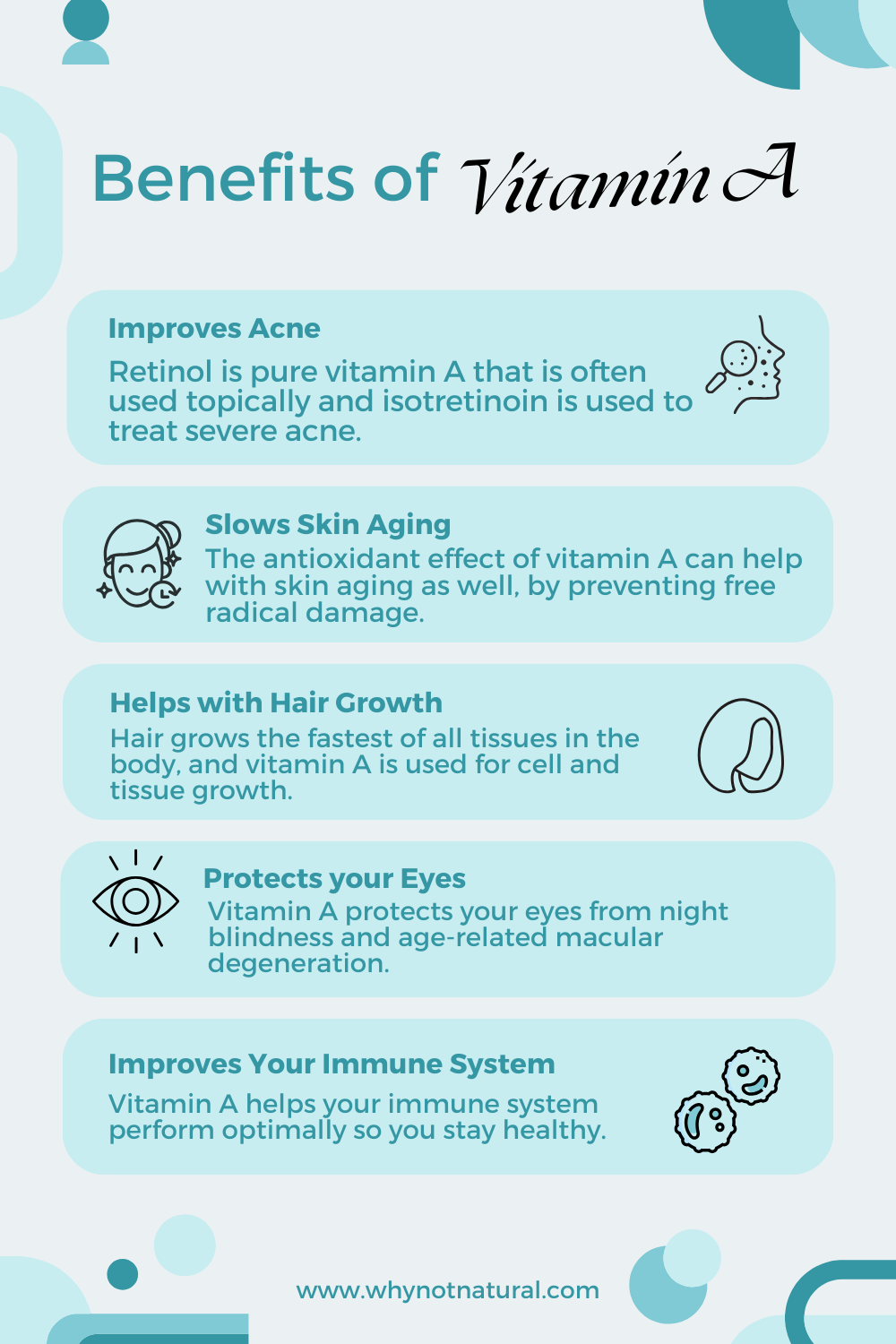

· By Kelin Marquet
Vitamin A: Benefits, Food Sources, and Why It Matters
Vitamin A is an essential fat-soluble nutrient your body needs for healthy vision, strong immunity, and proper cell growth (including tissues like skin and hair). It plays many important roles, yet deficiency is still common in some parts of the world.
Forms of Vitamin A
There are two main forms:
-
Provitamin A (Carotenoids): Found in colorful plant foods like carrots, sweet potatoes, and leafy greens. Your body converts carotenoids (like beta carotene) into vitamin A, but the conversion rate can vary from person to person.
-
Preformed Vitamin A (Retinoids): Found in animal products (like liver, fish, and dairy) and in supplements. Retinoids are more easily used directly by the body.
1. Vitamin A and Skin Health
Topical forms of vitamin A, like retinol, are commonly used in skincare to support acne treatment and reduce signs of aging. Research shows retinoids can help regulate skin cell turnover and reduce inflammation.*
⚠️ Oral vitamin A should only be used under medical supervision for acne, since high doses can be unsafe.
2. Vitamin A and Healthy Aging
Vitamin A’s antioxidant properties help protect cells from oxidative stress. Topical retinol has been shown to improve the appearance of fine lines and wrinkles by boosting collagen production and skin hydration. Those with higher vitamin A levels in the skin often show a more youthful appearance in studies.*
3. Vitamin A and Hair Health
Your hair is among the fastest-growing tissues in the body, and vitamin A supports the growth and maintenance of healthy cells, including hair follicles. It also helps sebaceous glands produce sebum, which keeps the scalp moisturized. Both deficiency and excess intake of vitamin A may be linked to hair loss — so balance is key.
4. Vitamin A and Vision
Vitamin A is essential for eye health, helping prevent night blindness (one of the earliest signs of deficiency). Studies also suggest that antioxidant formulas including vitamin A may help lower the risk of age-related macular degeneration in older adults.*
5. Vitamin A and Immunity
Vitamin A supports the immune system by helping your body defend against infections. Deficiency is associated with a higher risk of respiratory and gastrointestinal infections, and supplementation has been shown to reduce the severity of some illnesses in deficient populations.

Sources of Vitamin A
Retinoid sources
The best sources of vitamin A are retinoids, because these can be absorbed directly by the body without conversion. The easiest way to ensure consistent intake is to take a supplement — for example, Why Not Natural’s Liquid Vitamin A.
The richest food sources are animal products, especially liver (beef liver, lamb liver, cod liver oil), which are extremely high in retinol. Be cautious with liver intake if you are pregnant or taking high-dose vitamin A supplements: it's generally recommended to limit liver consumption to less than once per week during pregnancy due to the risk of excess retinol.
Provitamin A Sources
Plant sources (carotenoids) — like sweet potatoes, carrots, red bell peppers, and spinach — can provide provitamin A, but conversion to active vitamin A ranges widely (approx. 5–65%). If you suspect deficiency, there may be underlying absorption or conversion issues (e.g., gut health) to explore with your clinician.
Disclaimer: This article is for educational purposes only and is not medical advice. Please consult your healthcare provider before starting or changing any supplement routine.
